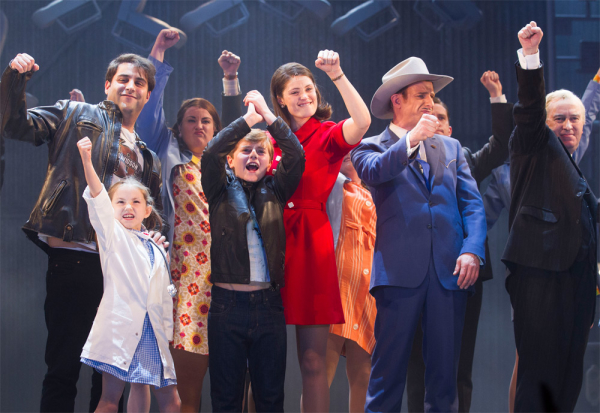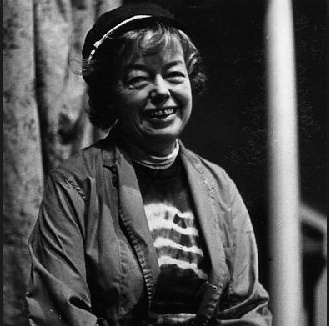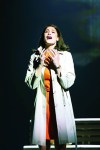Michael Coveney: First night flurry in Dagenham as HighTide regroups in Suffolk
Russell Brand rubbed shoulders with Andrew Lloyd Webber in the Adelphi stalls

© Dan Wooller for WhatsOnStage
There's a confusing article about first night reviewing in the programme for Made in Dagenham which suggests that critics dash away on the night to file for "early" editions and that these reviews are then pored over at the after-show party. The writer, my old friend Al Senter, is muddling West End and Broadway practice, and fading practice at that.
First, the "overnight reviews" insofar as they exist anymore, appear in that night's "late" editions of tomorrow's paper. And because in New York there is no "overnight" reviewing (the critics all go to previews), the "early" or "first" edition of the next day's Times or Post is available at midnight and can therefore be sent to Sardi's or the Tavern on the Green to soothe or savage the investors' beating breast.
Of course it's possible that last night's Made in Dagenham crowd could have called in "early" editions of today's papers to the after-party in the Northumberland Hotel and read the reviews anyway because the critics had attended a preview performance à la New York (poor loves can't manage an "overnight" in half an hour as was common practice even before the advent of new technology) and filed by mid-afternoon. And of course such reviews would have been on-line, too, well before midnight.
These "previewed" reviews never read with the sting or zest of genuine overnight reviews in the days when editors wanted such articles for the news pages because they were hot news. Even an opening at the Bush Theatre or the King's Head used to be "news" on the Financial Times (and the arts page was page three) in the mid-1970s. The Guardian and Times reviews of Made in Dagenham appear in the front part of the paper as though reporting on last night's news, which they aren't. This deception is bad for theatre, and bad for newspapers.
The Adelphi opening was a right old scrum, but it hummed with the raw intensity that creates genuine excitement around an event, though Russell Brand looked pretty laid back in the stalls, presumably punch drunk from the awful reviews of his latest book. Graham Norton air-kissed Andrew Lloyd Webber, Judy Craymer told me she was planning a second Mamma Mia! movie because everything is so dull on the new musical front on both sides of the Atlantic, that sort of thing.
More importantly, the audience also included four of the original Dagenham equal pay daredevils – Sheila, Gwen, Vera and Eileen – who lent proceedings another level of first night buzz (unavailable to the "previewers") similar to that of the original Calendar Girls attending their celebratory first night of bare bums and iced buns. The Mayor of Barking and Dagenham, Elizabeth Kangethe, was resplendent, too, in ceremonial green, while two exceptional Labour MPs, Margaret Hodge (Barking) and Caroline Flint (Don Valley) could attest to the spirit and verisimilitude of Sophie-Louise Dann's performance as their extraordinary 1960s predecessor in the Harold Wilson government, Barbara Castle.
Littlewood remembered as High Tide moves to Aldeburgh

Made in Dagenham exudes a distinct air of late Joan Littlewood (pictured) in the early 1970s at Stratford East, though Rupert Goold's production is of course much more sleek, expensive and soft-centred. Still, its heart is in the right place, and that might have appealed to Littlewood, whose full remarkable story is told for the first time in an authoritative third person by Peter Rankin, one of her closet colleagues and friends.
Rankin flagged up his official biography – Joan Littlewood: Dream and Realities (Oberon Books, £14.99) – on Libby Purves' Radio 4 Midweek programme on Wednesday morning, sounding as chirpy, chippy and devastatingly well-informed as ever. The book's an utter treat, revisiting Joan's Book – a rambling whopper which Rankin helped put together with her – and Howard Goorney's Theatre Workshop history – but telling the whole story, too, from cradle to grave, from Manchester Rep to Stratford East and beyond, her ideals, her passion, her fire, fury and failures in all their kick-ass splendour.
Very little of that sort of commodity around these days, but I've always liked the sound of (and enjoyed a taste of, too) the HighTide Festival in Suffolk. Now, after nine years based in Halesworth, the festival is upping sticks and regrouping in Aldeburgh, not as an adjunct to the well-established Aldeburgh summer music festival (now supervised by former Radio 3 boss and Proms supremo Roger Wright) but as a September complementary in that culturally festive environment. Not Joan Littlewood's sort of scene at all.
I had a drink a few weeks ago with executive director Holly Kendrick who explained that Aldeburgh offered a better choice and range of venues, more accommodation for the actors and formed a better base for its outreach work in local schools. Artistic plans, to be announced after Christmas, are bubbling under with promise of the spiky and unexpected, and Holly's hoping that Paines Plough might pitch their pop-up wooden tent there, too, or even lend it to them.
All enterprises such as Littlewood's Theatre Workshop or Steve Atkinson's HighTide depend, at some point, on the material kindness of strangers. HighTide receives about a quarter of its turnover (£191,000) from the Arts Council, the rest generated through box office, gifts, donations. One board member, Clare Parsons, provides six London desks, rent free, in a basement office in Farringdon, home of the financial and legal PR firm Lansons where she works. That's what you call practical, creative sponsorhip; and good PR, probably, too.














